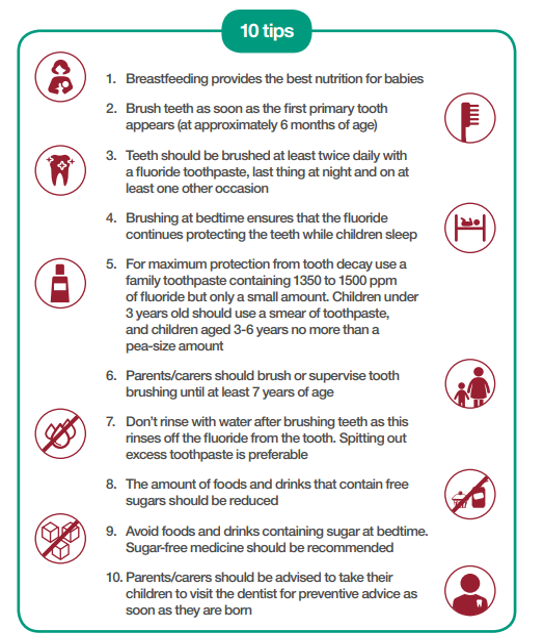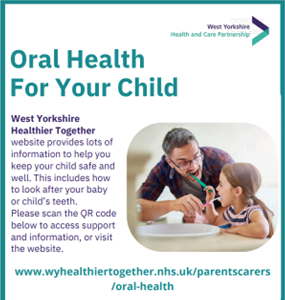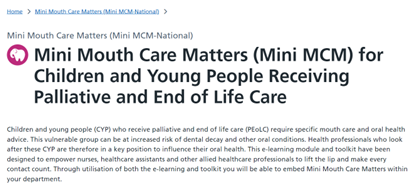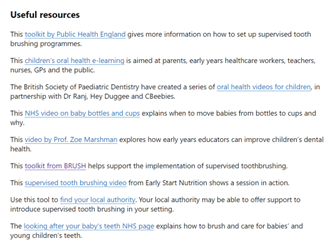Paediatric oral health resources for professionals
Stats and Facts
- Tooth decay is the most common oral disease affecting
 children and young people in England. It is preventable.
children and young people in England. It is preventable. - 24% of 5 year old children have tooth decay and have on average 3 teeth affected. This figure rises to 29% across Yorkshire and the Humber.
- 11% of 3 year olds have visible tooth decay with an average of 3 teeth affected.
- Some of the most vulnerable and disadvantaged children and young people (including isolated groups such as young carers and military families) may have more significant oral health problems.
- Tooth decay is the most common reason for hospital admissions for children aged 5 to 9 years.
Resources
 Our resources section on West Yorkshire Healthier Together includes a poster for professional use, promoting the oral health pages with an easy access QR code.
Our resources section on West Yorkshire Healthier Together includes a poster for professional use, promoting the oral health pages with an easy access QR code.
 Delivering better oral health. This is an evidence based toolkit to support dental teams in improving both oral and general health within the population.
Delivering better oral health. This is an evidence based toolkit to support dental teams in improving both oral and general health within the population.
 Child oral health: Applying all our health. This guide for child oral health is part of ‘All Our Health’, a resource which helps health and care professionals prevent ill health and promote wellbeing as part of their everyday practice.
Child oral health: Applying all our health. This guide for child oral health is part of ‘All Our Health’, a resource which helps health and care professionals prevent ill health and promote wellbeing as part of their everyday practice.
 Improving oral health for children and young people. Useful tips, facts, infographics and oral health related statistics for health visitors, school nurses and practice nurses.
Improving oral health for children and young people. Useful tips, facts, infographics and oral health related statistics for health visitors, school nurses and practice nurses.
 Mini Mouth Care Matters (Mini MCM) for Children and Young People Receiving Palliative and End of Life Care. Children and young people (CYP) who receive palliative and end of life care (PEoLC) require specific mouth care and oral health advice. This vulnerable group can be at increased risk of dental decay and other oral conditions. Health professionals who look after these CYP are therefore in a key position to influence their oral health. This e-learning module and toolkit have been designed to empower nurses, healthcare assistants and other allied healthcare professionals to lift the lip and make every contact count. Through utilisation of both the e-learning and toolkit you will be able to embed Mini Mouth Care Matters within your department.
Mini Mouth Care Matters (Mini MCM) for Children and Young People Receiving Palliative and End of Life Care. Children and young people (CYP) who receive palliative and end of life care (PEoLC) require specific mouth care and oral health advice. This vulnerable group can be at increased risk of dental decay and other oral conditions. Health professionals who look after these CYP are therefore in a key position to influence their oral health. This e-learning module and toolkit have been designed to empower nurses, healthcare assistants and other allied healthcare professionals to lift the lip and make every contact count. Through utilisation of both the e-learning and toolkit you will be able to embed Mini Mouth Care Matters within your department.
 Help for early years providers : Oral health this includes a list of useful references from the department of education.
Help for early years providers : Oral health this includes a list of useful references from the department of education.
NHSE eLFH Behaviour Change Conversation with Parents of Young Children: This session introduces you to ways in which you can support parents to develop good oral health habits through effective behaviour change conversations.
Rolling with resistance: These videos developed by the Leeds School of Dentistry show different techniques to managing challenging conversations with parents of young children.
The Department for Education have developed Help for early years providers : Oral health with information on how to promote good oral health to young children and their families.
Dept of Health & Social Care have produced posters and leaflets that can be downloaded: Better Health Start for Life Top Tips For Teeth | Campaigns | Campaign Resource Centre
Calderdale Oral Health Team have produced digital guides to support with promoting good oral health and healthy eating, they include education resources and presentations, SEND resources, links to share with families and are broken down into age groups:
Oral health promotion for ages 0 to 4
Oral health promotion for ages 5 to 11
Oral health promotion for ages 12 to 18
HABIT webinar (Health visitors delivering Advice in Britain on Infant Toothbrushing). The webinar focused on supporting health visiting teams to have effective oral health conversations with parents of young children. The resources to support these conversations, parent facing and professional facing are available at www.toothbrushinghabit.com
Toothbrushing demonstration
Some health professionals may be required to demonstrate the correct tooth brushing technique for children and babies. The video below, developed by the Leeds School of Dentistry, is designed to guide your toothbrushing demonstrations and is aimed at healthcare visitors. It describes effective toothbrushing demonstrations to parent and carers of babies aged 1 to 2.
HABIT Training
HABIT supports Health Visitors, and their wider team, to have effective oral health conversations with parents of young infants. It is underpinned by robust behaviour change theory (including systematic reviews, qualitative interviews, intervention mapping and community engagement).
We continue to undertake research in this area, and are exploring the value of different training approaches, as well as upskilling nursery nurses within the Health Visiting team to undertake oral health champion roles.
For further information, please have a look at our website or get in touch:
University of Leeds, School of Dentistry.




